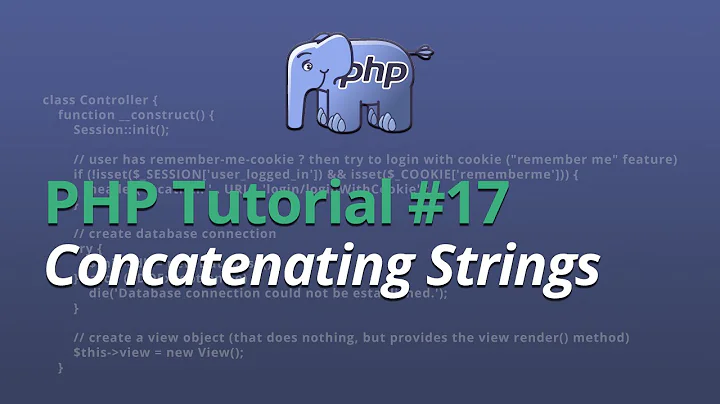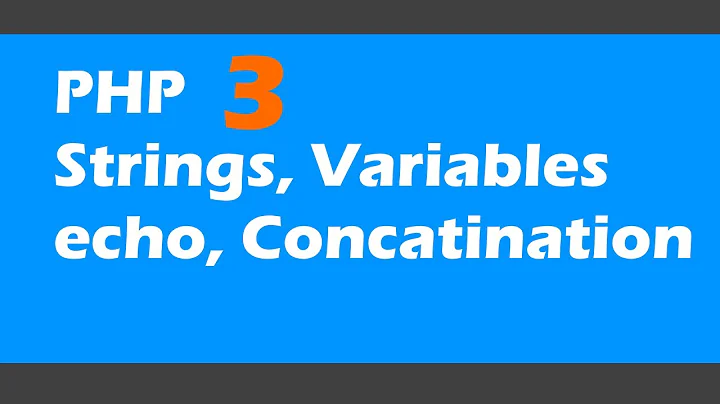PHP - concatenate or directly insert variables in string
Solution 1
Between those two syntaxes, you should really choose the one you prefer :-)
Personally, I would go with your second solution in such a case (Variable interpolation), which I find easier to both write and read.
The result will be the same; and even if there are performance implications, those won't matter 1.
As a sidenote, so my answer is a bit more complete: the day you'll want to do something like this:
echo "Welcome $names!";
PHP will interpret your code as if you were trying to use the $names variable -- which doesn't exist.
- note that it will only work if you use "" not '' for your string.
That day, you'll need to use {}:
echo "Welcome {$name}s!"
No need to fallback to concatenations.
Also note that your first syntax:
echo "Welcome ".$name."!";
Could probably be optimized, avoiding concatenations, using:
echo "Welcome ", $name, "!";
(But, as I said earlier, this doesn't matter much...)
1 - Unless you are doing hundreds of thousands of concatenations vs interpolations -- and it's probably not quite the case.
Solution 2
Double-quoted strings are more elegant because you don't have to break up your string every time you need to insert a variable (like you must do with single-quoted strings).
However, if you need to insert the return value of a function, this cannot be inserted into a double-quoted string--even if you surround it with braces!
//syntax error!!
//$s = "Hello {trim($world)}!"
//the only option
$s = "Hello " . trim($world) . "!";
Solution 3
Since php4 you can use a string formater:
$num = 5;
$word = 'banana';
$format = 'can you say %d times the word %s';
echo sprintf($format, $num, $word);
Source: sprintf()
Solution 4
I prefer this all the time and found it much easier.
echo "Welcome {$name}!"
Solution 5
Either one is fine. Use the one that has better visibility for you. And speaking of visibility you can also check out printf.
Related videos on Youtube
Web_Designer
Warning: Stack overflow was a deep pit for me. I wanted to be esteemed by others. But what is highly esteemed by others is detestable in the sight of God. Jesus said, "What would it profit you to gain the whole world and forfeit your soul?" God is patient, but He never fails to fulfill His word. Judgement will come where everyone will be repaid for their deeds. Read the Bible and give up everything to obey Jesus.
Updated on August 12, 2020Comments
-
Web_Designer over 3 years
I am wondering, What is the proper way for inserting PHP variables into a string?
This way:echo "Welcome ".$name."!"Or this way:
echo "Welcome $name!"Both of these methods work in my
PHP v5.3.5. The latter is shorter and simpler but I'm not sure if the first is better formatting or accepted as more proper.-
 KJYe.Name about 13 yearsif you were doing the first, i personally prefer single quote
KJYe.Name about 13 yearsif you were doing the first, i personally prefer single quoteecho 'Welcome '.$name.'!'; -
 Dejan Marjanović about 13 years
Dejan Marjanović about 13 years -
Khez about 13 years@kjy112 I said the same thing in my answer, I'm a HUGE fan of single quotes :X
-
 KJYe.Name about 13 yearssingle quote vs double quote performance, but for something like this you wont' notice much: stackoverflow.com/questions/482202/…
KJYe.Name about 13 yearssingle quote vs double quote performance, but for something like this you wont' notice much: stackoverflow.com/questions/482202/… -
Marc B about 13 yearsPersonally, I ignore the entire "single quotes are more efficient" and just go for "use whichever quoting style requires the last amount of internal escaping". It is highly unlikely that any code you write will benefit from any MICROSCOPIC gains due to less string parsing v.s. increased string concatenation.
-
Web_Designer over 12 years@kjy112 would the second method work with single quotes?
-
Damian almost 8 yearsPerformance loss claim is false. See this article as reference: nikic.github.io/2012/01/09/…
-
-
Web_Designer about 13 yearsExcellent, Thank you! it is very nice to know that I can use my favorite method of inserting it directly into the string, and I am very thankful for now knowing how to separate the variable from the rest of the sting if need be using the
{}. -
Web_Designer about 13 yearsIve got the textarea needed. PSPad rocks.
-
Marc B about 13 yearsYou can insert functions semi-indirectly into strings via PHP 5.3 variable functions.
$x = function() { ...}; $string = "hello {$x(blah blah blah)}", which works around the "restriction". -
Marc B about 13 yearsTHis applies only to echo, though. Try it for a variable assignment and watch your code blow up.
-
AI52487963 about 13 years@Marc That's cool, I didn't know that! You can also assign the name of an existing function to a variable and do the same thing:
$x = 'trim'; $string = "hello {$x('blah blah blah')}"; -
 Your Common Sense about 13 yearsthat's cool but extremely unreadable, so, one have to avoid it anyway.
Your Common Sense about 13 yearsthat's cool but extremely unreadable, so, one have to avoid it anyway. -
cHao about 13 years-1 for premature optimization. The difference in performance is not enough to be a factor unless you're printing millions of times in one script -- and even then, any other processing you do will dwarf the extra couple of seconds you might spend printing one way instead of the other. The major difference between them is readability (which leads me to prefer the second style).
-
 Pekka about 13 years-1: Using single quotes has no real-life effect on performance whatsoever. The linked page shows differences between the two methods in microseconds, that is 0.000001 seconds. Any database query is going to take hundreds of times that time. This debate is entirely pointless.
Pekka about 13 years-1: Using single quotes has no real-life effect on performance whatsoever. The linked page shows differences between the two methods in microseconds, that is 0.000001 seconds. Any database query is going to take hundreds of times that time. This debate is entirely pointless. -
 Your Common Sense about 13 yearsI can try to answer your last question. There are many wild rumors in PHP community and some of them are very strong. It's great struggle to disclose them and takes time. But slowly it's changing. So, the answer you linked to is old one, from the times when people didn't care. While in this one some people answered based on their own experience, not on some article they read.
Your Common Sense about 13 yearsI can try to answer your last question. There are many wild rumors in PHP community and some of them are very strong. It's great struggle to disclose them and takes time. But slowly it's changing. So, the answer you linked to is old one, from the times when people didn't care. While in this one some people answered based on their own experience, not on some article they read. -
colincameron about 11 yearsJust a note that separating the string literals and variables with commas only works with
echo, not anywhere else. -
 Sarath Sadasivan Pillai almost 9 years
Sarath Sadasivan Pillai almost 9 years$s = 'Hello ' . trim($world) .'!';Try using single quotes when there is nothing to interpolate in string.It will improve performance and can be used as a convention to identify both -
Fernando Cordeiro over 8 yearsJust pointing out on the performance:
time php -r '$string=""; for ($i=0;$i<199999;$i++){ $string = $string.$i; } print("Done!\n");'(Concatenation) actually loses by about 300 milliseconds (for 200.000 items, that's 1 miliseconf per thousand elements on your set...). That's statistical noise, it's impossible to even measure any difference. Considering it's more readable,time php -r '$string=""; for ($i=0;$i<199999;$i++){ $string = "{$string}{$i}"; } print("Done!\n");'(Interpolation) is the undisputed winner... -
Damian almost 8 yearsPerformance loss is false +1 @cHao. Here's a article with the metrics proving it. nikic.github.io/2012/01/09/…
-
 Máxima Alekz over 7 yearsIf want to use interpolation, you have to use double quotes.
Máxima Alekz over 7 yearsIf want to use interpolation, you have to use double quotes. -
 evilReiko about 6 yearsGood point for mentioning
evilReiko about 6 yearsGood point for mentioning\r,\nand\tas other answers didn't include this bit. -
 strix25 over 5 yearsis it possible to use functions inside string ? like echo "This is {foo()} nice"; ?
strix25 over 5 yearsis it possible to use functions inside string ? like echo "This is {foo()} nice"; ? -
Javier Arias about 5 yearsBy far the safest option. +1 for good practice and general convention matching other languages
-
s3c about 4 yearsYou should use PDOs instead
-
Alexander Behling about 2 years@strix25 No, this is not possible. Moreover, the interpolation method ({}) does not work with constants either. So I don't think that this interpolation is the right way. You should ask yourself why you should not use concatenation. If you can't find a reasonable answer, you should prefer concatenation to interpolation. Although I haven't tested it yet, I don't think there are noticeable performance differences between one method and the other. And if there are any, they are in an imperceptible amount of time (max. any ms), as is the case with the single quote vs. double quote debate.






